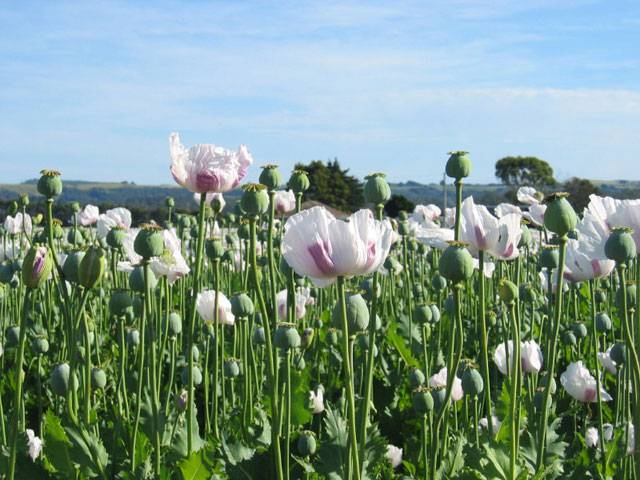UNITED NATIONS : Afghanistan has retained its position as the lead producer and cultivator of opium globally, with 74 percent of the world’s illicit opium production in 2012, according to the 2013 World Drug Report, launched by the U.N. Office on Drugs and Crime (UNODC) at a special high-level event of the Commission on Narcotic Drugs (CND) in Vienna on Wednesday.
The report, which was also released at UN Headquarters in New York, also notes that the global area under opium poppy cultivation amounted to 236,320 hectares in 2012, up 14 per cent from 2011. Nonetheless, given a poor yield, owing to a plant disease affecting the opium poppy in Afghanistan, global opium production fell to 4,905 tons in 2012, 30 per cent less than a year earlier and 40 per cent less than in the peak year of 2007.
“Afghanistan’s large-scale drugs economy is another source, driver and symptom of instability,” UNs Jan Kubis.
This illicit production and trade simultaneously funds insurgent activity and if not curtailed, threatens to undermine Afghanistan’s institutions, security and economic self-sufficiency. The global and regional consequences demand resolute and targeted action,” said the UN Secretary-General’s Special Representative for Afghanistan, Jan Kubis.
According to UNODC data, nearly one million Afghans, between 15-64 years of age, are affected by drug use in the South Asian nation.
“The human suffering of Afghanistan’s drug problem is not only felt in the streets of the world capitals. It is creating havoc among its own citizens, dependent on a daily dose of opium and heroin above all – but also cannabis, painkillers and tranquilizers,” said UNODC’s Representative in Afghanistan, Jean-Luc Lemahieu. “Afghanistan is confronted by one of the highest levels of addiction in the world.”
“Many Afghans are taking drugs as a kind of self-medication against the hardships of life,” Lemahieu added. “The criminals involved in trafficking and cultivating opium need to face the misery they create in their own neighbourhoods and among their brothers, sisters, cousins and friends. They do have a direct responsibility.”
UNODC added that addiction also poses a high social and economic cost, unlikely to be borne by the country’s current public budget. Currently, only 10 percent of drug users had received any form of drug treatment – an issue of major concern to the UN agency.
“More than 700,000 Afghans have no access to drug treatment. It is a silent and creeping tragedy and in name of international solidarity, I do invite the nations that are concerned about Afghanistan’s efforts to curb drug cultivation to help it as well overcome its drug-related health crisis,” said Lemahieu.
Wednesday’s special high-level event of the CND in Vienna marked the first step on the road to the 2014 high-level review by the Commission on Narcotic Drugs of the Political Declaration and Plan of Action which will be followed, in 2016, by the UN General Assembly Special Session on the issue.
Thursday, April 18, 2024
Afghanistan leading opium producer: UN

Stefanos Tsitsipas advances in Barcelona
4:19 PM | April 18, 2024
Met Office predicts more rains across country till April 29
2:51 PM | April 18, 2024
Punjab changes school timings for summer season
1:55 PM | April 18, 2024
Enemies of Pakistan are unable to digest investment in the country: Ataullah Tarar
1:29 PM | April 18, 2024
IHC restores Bushra Bibi's appeal for shifting to Adiala Jail from Bani Gala
1:24 PM | April 18, 2024
Hepatitis Challenge
April 18, 2024
IMF Predictions
April 18, 2024
Wheat War
April 18, 2024
Rail Revival
April 17, 2024
Addressing Climate Change
April 17, 2024
Justice denied
April 18, 2024
AI dilemmas unveiled
April 18, 2024
Tax tangle
April 18, 2024
Workforce inequality
April 17, 2024
New partnerships
April 17, 2024
ePaper - Nawaiwaqt
Advertisement
Nawaiwaqt Group | Copyright © 2024





